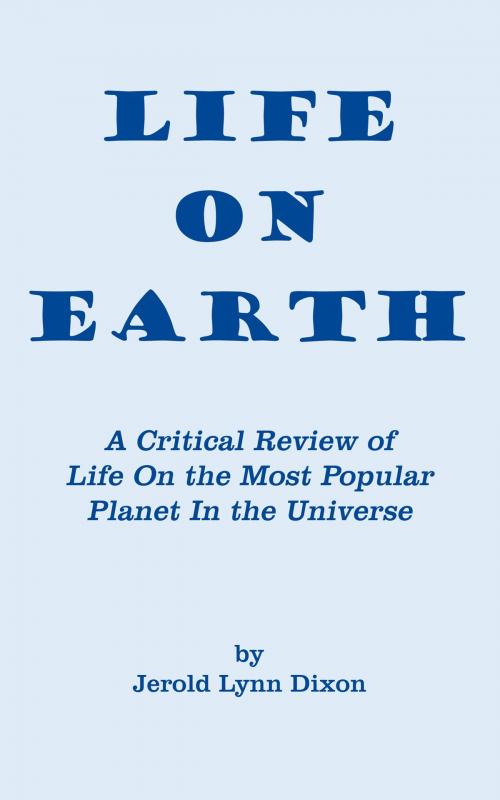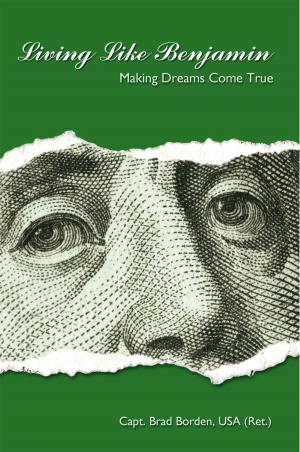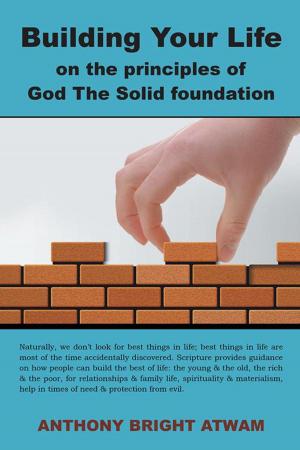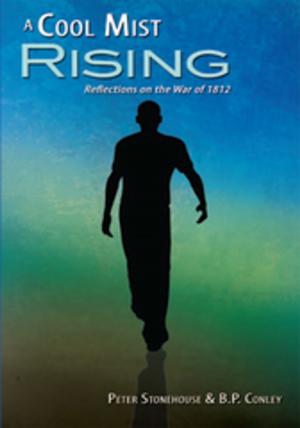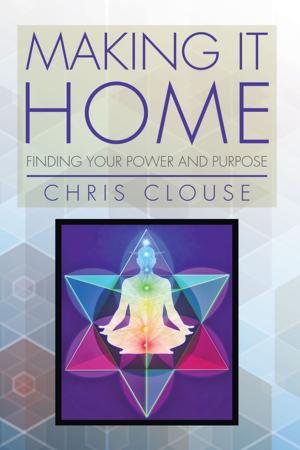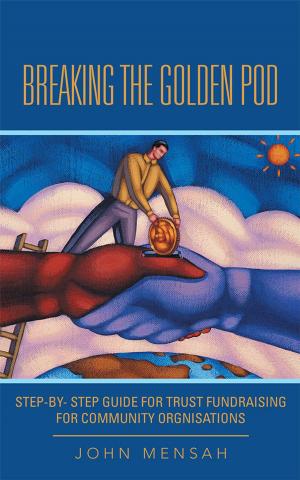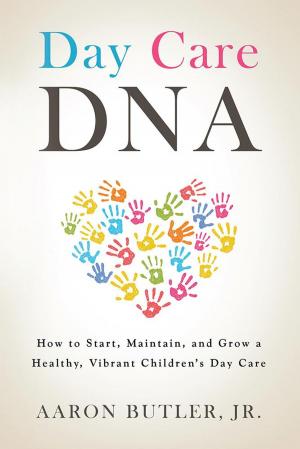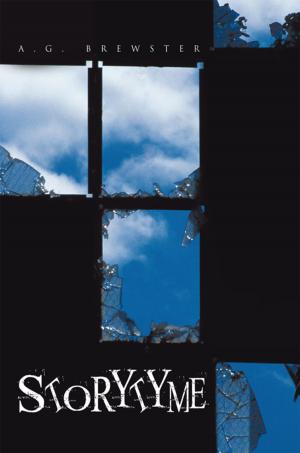Life on Earth
A Critical Review of Life on the Most Popular Planet in the Universe
Nonfiction, Social & Cultural Studies, Social Science, Sociology, Religion & Spirituality, Philosophy, Political Science| Author: | Jerold Lynn Dixon | ISBN: | 9781452036359 |
| Publisher: | AuthorHouse | Publication: | November 19, 2010 |
| Imprint: | AuthorHouse | Language: | English |
| Author: | Jerold Lynn Dixon |
| ISBN: | 9781452036359 |
| Publisher: | AuthorHouse |
| Publication: | November 19, 2010 |
| Imprint: | AuthorHouse |
| Language: | English |
How to decide if this book is for you:
(1) Do you live here? Yes__ No __
(2) Are you thinking about moving here? Yes__ No __
If you checked yes for 1 or 2, then you should read this book.
F O R W A R D By David Steiner Life On Earth is many things. It is one mans take on the state of humanity. It is a mental tool with which the reader can form his or her own guide to surviving among these strange, flawed creations of a supposedly infallible deity. It is a list of questions that any reasonable person might choose to ask of the Creator, should that person be given the chance to do so. Lastly, Life On Earth, as professed by Jerold Dixon, himself, is fair warning to any intelligent beings who may wish to set down roots among us. Well, think about it; If someone did have the technological capabilities to come here, it would stand to good reason that said being would also be able to tap a few of our geosynchronous-orbiting communications satellite networks, look for just such a touted volume of work and wind up downloading an electronic copy of the very words before your eyes. What this engagingly-written book really boils down to is an overview of the human condition as seen through the eyes of a man who has lived through what could arguably be called the fastest and most radically changing decades of American history. The latter half of the twentieth century ushered us, at breakneck speeds, into human space exploration, social reform, political awareness, political correctness, and new and confusing concepts regarding accepted gender roles, relationship dynamics and the evolving definition of the family unit. Nobody can reasonably argue against the statement that not all progress is either forward or good. The human animal continues to retain dark nuances, violent tendencies, and primal desires that produce a proverbial evil, mirror-universe reaction to every forwardly progressive action we take. We discovered how to manipulate atomic energy-and used it to build the first, true weapon of mass destruction. Women became empowered members of the workplace-and the traditional family unit began to decay. We figured out how to have condom-free sex without procreating-and started having so much of it with so many partners that harmful and even lethal STDs became global epidemics. We figured out how to cheaply and easily conduct worldwide discussions about any subject at all-and fundamentalist hate groups use the same venue to broadcast their calls to commit acts of cold-blooded murder in the names of racial or theological purity. Where some look at the negative (and even some of the positive) changes society has undergone in recent history and see them as reasons to deny Gods existence altogether, Dixon would rather see accountability where accountability is due. That is not to say that the author blames God for the messes we have made for ourselves. He does, however, blame Him for the inherent flaws in our basic design, and he sees how some of those flaws could be viewed as being both the causes and the enablers of some of mankinds messiest mistakes. He questions how and why a supposedly perfect being would create an entire species of self-aware beings, but with such deficiencies as to cause pain and suffering, in both the emotional and physical senses. The author is outraged at the inequities of life, and wants to know why we must endure them. He feels that, if given the chance, each and every one of us should confront God. It is Dixons contention that as we are to be inevitably held accountable for our mistakes, so should we be able to cross-examine the Almighty to take credit for his own. Life On Earth was a thoroughly enjoyable read. Perhaps to date, the most thought-provoking of the works for which I had the esteemed honor of being contracted to edit. In fact, at the time of the crafting of this forward, I have been pondering for over a week on how to answer a biblically-based, yet current-event inspired philosophical question Mr. Dixon had posed in an email. Which brings me to the best that I can think of describing him. Jerold Dixon is an open-minded version of an old-school, red-blooded, American guy. He calls em like he sees em, but then he makes you stop and actually think.
How to decide if this book is for you:
(1) Do you live here? Yes__ No __
(2) Are you thinking about moving here? Yes__ No __
If you checked yes for 1 or 2, then you should read this book.
F O R W A R D By David Steiner Life On Earth is many things. It is one mans take on the state of humanity. It is a mental tool with which the reader can form his or her own guide to surviving among these strange, flawed creations of a supposedly infallible deity. It is a list of questions that any reasonable person might choose to ask of the Creator, should that person be given the chance to do so. Lastly, Life On Earth, as professed by Jerold Dixon, himself, is fair warning to any intelligent beings who may wish to set down roots among us. Well, think about it; If someone did have the technological capabilities to come here, it would stand to good reason that said being would also be able to tap a few of our geosynchronous-orbiting communications satellite networks, look for just such a touted volume of work and wind up downloading an electronic copy of the very words before your eyes. What this engagingly-written book really boils down to is an overview of the human condition as seen through the eyes of a man who has lived through what could arguably be called the fastest and most radically changing decades of American history. The latter half of the twentieth century ushered us, at breakneck speeds, into human space exploration, social reform, political awareness, political correctness, and new and confusing concepts regarding accepted gender roles, relationship dynamics and the evolving definition of the family unit. Nobody can reasonably argue against the statement that not all progress is either forward or good. The human animal continues to retain dark nuances, violent tendencies, and primal desires that produce a proverbial evil, mirror-universe reaction to every forwardly progressive action we take. We discovered how to manipulate atomic energy-and used it to build the first, true weapon of mass destruction. Women became empowered members of the workplace-and the traditional family unit began to decay. We figured out how to have condom-free sex without procreating-and started having so much of it with so many partners that harmful and even lethal STDs became global epidemics. We figured out how to cheaply and easily conduct worldwide discussions about any subject at all-and fundamentalist hate groups use the same venue to broadcast their calls to commit acts of cold-blooded murder in the names of racial or theological purity. Where some look at the negative (and even some of the positive) changes society has undergone in recent history and see them as reasons to deny Gods existence altogether, Dixon would rather see accountability where accountability is due. That is not to say that the author blames God for the messes we have made for ourselves. He does, however, blame Him for the inherent flaws in our basic design, and he sees how some of those flaws could be viewed as being both the causes and the enablers of some of mankinds messiest mistakes. He questions how and why a supposedly perfect being would create an entire species of self-aware beings, but with such deficiencies as to cause pain and suffering, in both the emotional and physical senses. The author is outraged at the inequities of life, and wants to know why we must endure them. He feels that, if given the chance, each and every one of us should confront God. It is Dixons contention that as we are to be inevitably held accountable for our mistakes, so should we be able to cross-examine the Almighty to take credit for his own. Life On Earth was a thoroughly enjoyable read. Perhaps to date, the most thought-provoking of the works for which I had the esteemed honor of being contracted to edit. In fact, at the time of the crafting of this forward, I have been pondering for over a week on how to answer a biblically-based, yet current-event inspired philosophical question Mr. Dixon had posed in an email. Which brings me to the best that I can think of describing him. Jerold Dixon is an open-minded version of an old-school, red-blooded, American guy. He calls em like he sees em, but then he makes you stop and actually think.
